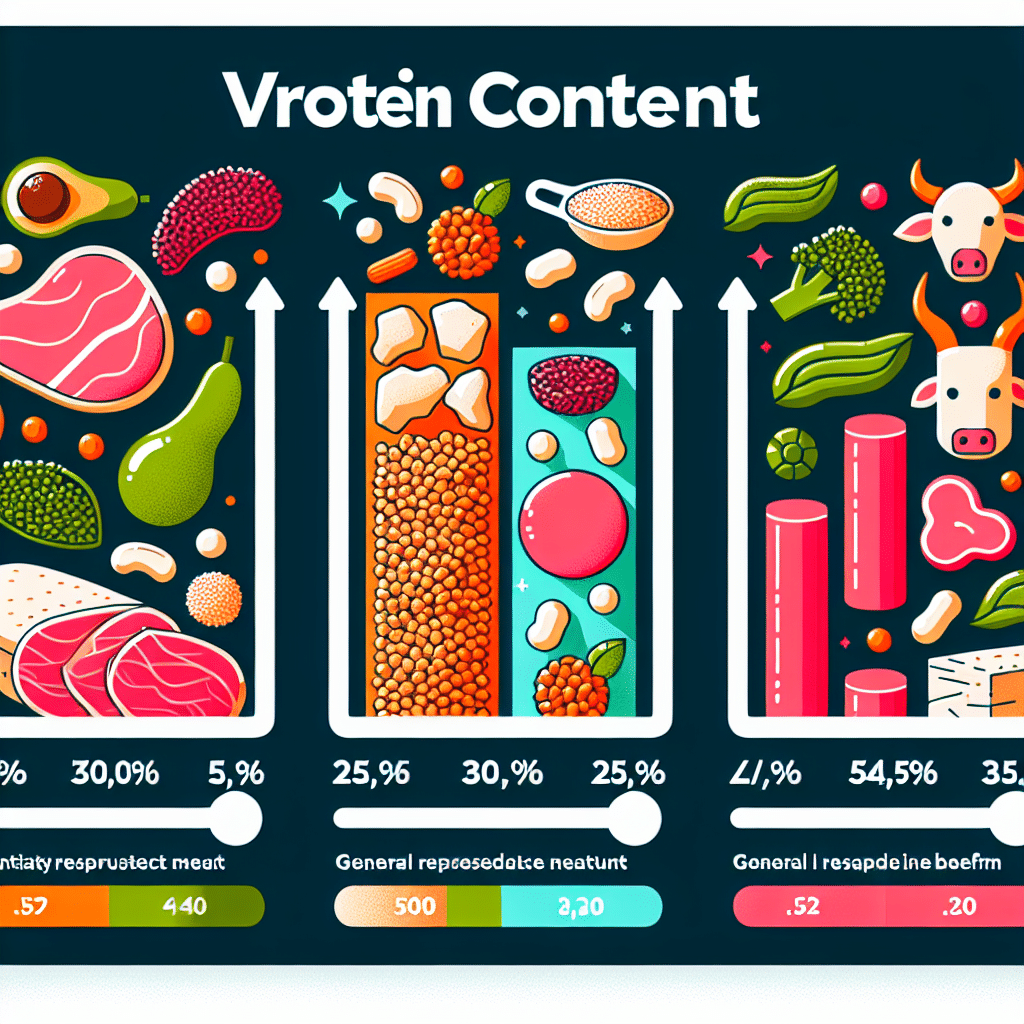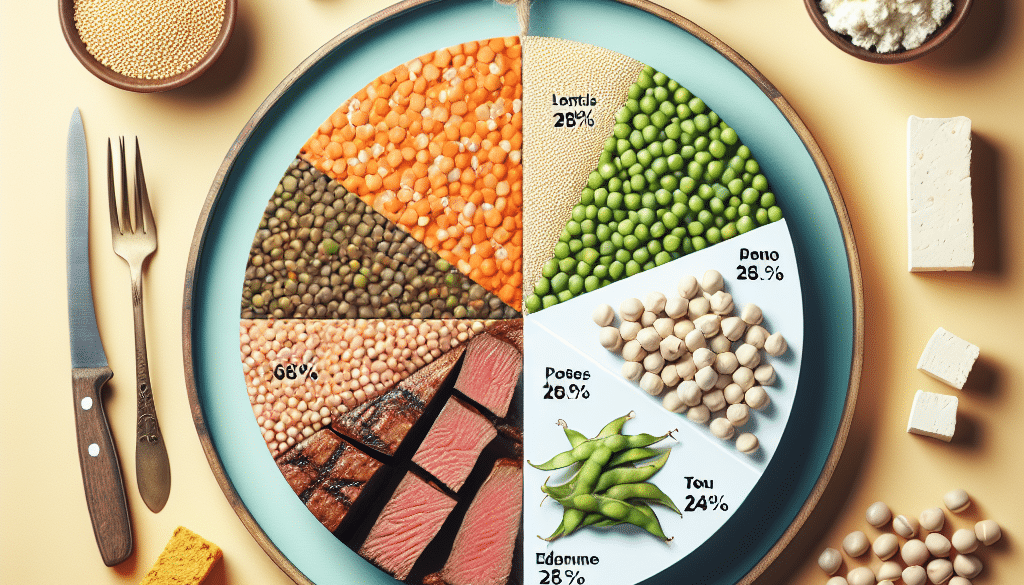What Vegan Food Has More Protein Than Meat?
-
Table of Contents
Vegan Foods with Higher Protein Content Than Meat

When it comes to protein, meat has long been the go-to source for many. However, with the rise of veganism and plant-based diets, there’s a growing interest in finding vegan foods that can match or even exceed the protein content of meat. This article explores the world of plant-based proteins that not only rival but sometimes surpass their meat counterparts in protein density.
Understanding Protein in Vegan Foods
Protein is a crucial macronutrient necessary for building and repairing tissues, making enzymes and hormones, and supporting overall health. While meat is known for its high protein content, there are numerous plant-based sources that offer ample protein while also providing additional health benefits such as fiber, vitamins, and minerals.
Top Vegan Protein Sources
Let’s delve into some of the most protein-rich vegan foods that can serve as excellent alternatives to meat:
- Seitan: Often known as wheat meat, seitan is a popular meat substitute made from gluten, the main protein in wheat. It contains about 25 grams of protein per 3.5 ounces (100 grams), which is comparable to most meats.
- Lentils: With 18 grams of protein per cooked cup (240 ml), lentils are a powerhouse of protein and other nutrients like fiber, iron, and potassium.
- Chickpeas and Most Varieties of Beans: Chickpeas, black beans, and kidney beans provide about 15 grams of protein per cooked cup (240 ml). They are also rich in complex carbs, fiber, iron, folate, phosphorus, potassium, manganese, and several beneficial plant compounds.
- Nutritional Yeast: This cheesy-tasting condiment is fortified with protein, vitamins, minerals, and antioxidants. Two tablespoons provide about 8 grams of protein.
- Spelt and Teff: Ancient grains like spelt and teff are high in protein, offering 10-11 grams per cooked cup (240 ml).
- Hempseed: Hemp seeds are complete proteins, which means they contain all nine essential amino acids. Three tablespoons of hemp seeds can provide about 10 grams of protein.
- Green Peas: A cup of cooked green peas contains 9 grams of protein, which is slightly more than a cup of milk.
- Spirulina: This blue-green algae packs around 8 grams of protein per two tablespoons, along with a hefty dose of calcium, iron, potassium, and B vitamins.
- Quinoa: Known as a complete protein, quinoa has approximately 8 grams of protein per cooked cup (240 ml).
- Nuts and Seeds: Almonds, chia seeds, flaxseeds, and sunflower seeds are high in protein, with almonds containing about 6 grams per ounce (28 grams).
Case Studies and Statistics
Research has shown that diets rich in plant-based proteins can be just as effective as meat-based diets for muscle and strength gains. A study published in the American Journal of Clinical Nutrition found that plant protein intake was positively associated with muscle mass in healthy adults. Furthermore, epidemiological studies suggest that higher intake of plant-based proteins is linked to lower risks of cardiovascular disease, hypertension, type 2 diabetes, and obesity.
Comparing Protein Content: Vegan vs. Meat
When comparing the protein content of vegan foods to meat, it’s important to consider the quality and digestibility of the protein. While meat provides high-quality, complete protein, many plant-based proteins are also complete or can be combined to provide all essential amino acids. For example, rice and beans eaten together form a complete protein source.
Here’s a quick comparison of protein content in common meats versus vegan sources per 100 grams:
- Beef: 26 grams of protein
- Chicken breast: 31 grams of protein
- Seitan: 25 grams of protein
- Lentils: 9 grams of protein
- Chickpeas: 19 grams of protein
While some vegan sources may seem lower in protein by weight, they are often consumed in larger portions and provide additional health benefits.
Conclusion: Embracing Plant-Based Proteins
In conclusion, there are numerous vegan foods that offer high levels of protein, sometimes exceeding that of meat. By incorporating a variety of these plant-based proteins into your diet, you can meet your protein needs while also enjoying the additional health benefits they provide. Whether you’re a vegan, vegetarian, or just looking to reduce your meat intake, these protein-rich vegan foods are excellent additions to your meals.
ETprotein: Your Source for High-Quality Vegan Proteins
If you’re looking for premium vegan protein sources, ETprotein offers a wide range of organic bulk vegan proteins that are perfect for anyone seeking to boost their protein intake with plant-based options. Their products, including organic rice protein, pea protein, and various seed proteins, are characterized by a neutral taste and are non-GMO and allergen-free. With L-(+)-Ergothioneine purity over 98%, ETprotein caters to industries such as nutraceuticals, pharmaceuticals, and food and beverage, providing comprehensive solutions for all your protein needs.
As a trusted supplier for leading global brands, ETprotein ensures the highest quality in their products. To learn more or to sample their products, contact ETprotein and email sales(at)ETprotein.com today.
About ETprotein:
ETprotein, a reputable protein and L-(+)-Ergothioneine (EGT) Chinese factory manufacturer and supplier, is renowned for producing, stocking, exporting, and delivering the highest quality organic bulk vegan proteins and L-(+)-Ergothioneine. They include Organic rice protein, clear rice protein, pea protein, clear pea protein, watermelon seed protein, pumpkin seed protein, sunflower seed protein, mung bean protein, peanut protein, and L-(+)-Ergothioneine EGT Pharmaceutical grade, L-(+)-Ergothioneine EGT food grade, L-(+)-Ergothioneine EGT cosmetic grade, L-(+)-Ergothioneine EGT reference grade and L-(+)-Ergothioneine EGT standard. Their offerings, characterized by a neutral taste, non-GMO, allergen-free attributes, with L-(+)-Ergothioneine purity over 98%, 99%, cater to a diverse range of industries. They serve nutraceutical, pharmaceutical, cosmeceutical, veterinary, as well as food and beverage finished product distributors, traders, and manufacturers across Europe, USA, Canada, Australia, Thailand, Japan, Korea, Brazil, and Chile, among others.
ETprotein specialization includes exporting and delivering tailor-made protein powder and finished nutritional supplements. Their extensive product range covers sectors like Food and Beverage, Sports Nutrition, Weight Management, Dietary Supplements, Health and Wellness Products, and Infant Formula, ensuring comprehensive solutions to meet all your protein needs.
As a trusted company by leading global food and beverage brands and Fortune 500 companies, ETprotein reinforces China’s reputation in the global arena. For more information or to sample their products, please contact them and email sales(at)ETprotein.com today.














